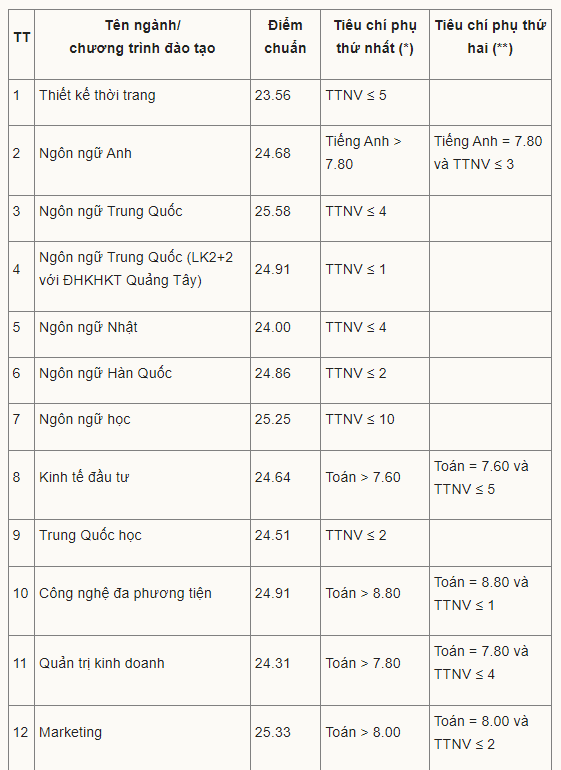The admission scores of Hanoi University of Industry in 2024 in Vietnam
The admission scores of Hanoi University of Industry in 2024 in Vietnam
Officially from today (August 17, 2024), university admission scores begin to be announced.
Among them, Hanoi University of Industry has announced its admission scores as follows:

Updating.............
What is the highest admission score of Hanoi University of Industry in 2024?
Based on the results announced by Hanoi University of Industry in 2024, the major with the highest admission score is with 26.05 points, surpassing the highest previous score of the Logistics and Supply Chain Management department (25.89). This is the total score of the three graduation exam subjects according to the combination, including priority points (if any).
The major with the lowest admission score is Environmental Engineering Technology, which also takes 19 points, the same as the lowest level of last year. All other majors have scores above 20 points.

The admission scores of Hanoi University of Industry in 2024 in Vietnam (Image from the Internet)
What should be done if a candidate in Vietnam does not confirm enrollment after being admitted?
Notification of results and confirmation of admission for university candidates are regulated in Article 21 of the University Admission Regulation and Preschool Education College Admission Regulation issued with Circular 08/2022/TT-BGDDT:
Notification of Results and Confirmation of Admission
1. The training institution sends the admission notice to the admitted candidates, specifying the necessary procedures for candidates when enrolling and the method of enrollment.
2. Candidates confirm their enrollment online before enrolling at the training institution.
3. For candidates who do not confirm their enrollment within the prescribed time frame:
a) If they do not have a valid reason, they are considered to have declined the admission, and the training institution has the right not to accept them;
b) If due to illness or accident with a confirmation from a district-level or higher hospital, or due to natural disasters with a confirmation from the district-level People's Committee or higher, the training institution will consider and decide whether to accept the candidate or reserve the admission results so that the candidate can enroll later;
c) If due to mistakes or errors caused by admission officers or the candidates themselves, the training institution will actively cooperate with the relevant individuals and organizations to review the evidence and decide whether to accept the candidate or reserve the admission results for later enrollment.
...
Thus, candidates who are admitted to university but do not confirm their enrollment without a valid reason are considered to have declined the admission, and the training institution has the right not to accept them.
However, candidates can still enroll in the following cases:
(1) If the non-confirmation of enrollment is due to illness or accident with a confirmation from a district-level or higher hospital, or due to natural disasters with a confirmation from the district-level People's Committee or higher, the training institution will consider whether to accept the candidate or reserve the admission results for later enrollment.
(2) If due to mistakes or errors caused by admission officers or the candidates themselves, the training institution will actively cooperate with the relevant individuals and organizations to review the evidence and decide whether to accept the candidate or reserve the admission results for later enrollment.
Note: Candidates who have confirmed enrollment at one institution cannot participate in subsequent admissions or supplementary admission rounds at other institutions unless permitted by the training institution.
What are basic principles in university admissions in 2024 in Vietnam?
According to the provisions of Article 4 of the Regulations issued with Circular 08/2022/TT-BGDDT, the basic principles in university admissions are as follows:
Basic Principles in Admissions
1. Fairness to candidates
a) Regarding information provision: Each interested candidate is provided with complete, clear, reliable, consistent, and prompt information to make appropriate decisions and prepare best for participating in admissions;
b) Regarding admission opportunities: No candidate loses admission opportunities due to irrelevant regulations to qualification or ability (except for specific regulations of the Ministry of Public Security and the Ministry of National Defense related to national defense and security) or due to cumbersome, costly admission procedures;
c) Regarding ability assessment: Candidates must be objectively, fairly, and reliably assessed on their learning ability and potential to meet the requirements of the program and training field;
d) Regarding admission opportunities: Candidates must be given the highest admission opportunities and the right to determine their priority aspirations among the programs and fields they qualify for;
e) Regarding commitment implementation: Training institutions must fulfill their commitments to candidates, provide advice, support, and resolve complaints, protecting legitimate rights of candidates in cases of risk.
2. Equality among training institutions
a) Regarding cooperation: Training institutions cooperate equally to enhance the quality and efficiency of admissions, bringing the best interests to candidates;
b) Regarding competition: Training institutions compete honestly, fairly, and healthily in admissions according to the provisions of the law on competition.
3. Transparency to society
a) Regarding information transparency: Training institutions are responsible for publicly announcing full, clear, and prompt admission information through appropriate media for society and state management agencies to supervise;
b) Regarding accountability: Training institutions are responsible for reporting as required by state management agencies and providing explanations to society in appropriate forms on major issues causing public concern.
The higher education institutions in 2024 need to comply with the basic principles in the admissions process as stipulated above.

